Clark was suddenly thrust into the ongoing national debate concerning free speech on college campuses last week, following the highly public and controversial resignation of Dr. Mary Jane Rein.
Rein was Executive Director of the Strassler Center for Holocaust and Genocide Studies, a position she held since 2006. In an op-ed published on April 14 in the Wall Street Journal, Rein paired the announcement of her departure with the news that she was taking on a new role at Assumption University, a Roman Catholic institution in Worcester.
Her resignation leaves the Strassler Center, which is financially independent of Clark, without a dedicated fund-raiser.
In the op-ed, titled “Why I’m Leaving Clark University,” Rein alleges that a group of students, “with the support of university leadership,” attempted to “silence” her at a public event in March held at Worcester State University.
A university administrator confirmed to The Scarlet that Rein tendered her official resignation on the same day that the op-ed was published. Within an hour, Assumption University launched a new landing page for its new Center for Civic Friendship. Rein will be the center’s founding director.
Rein’s op-ed prompted a swift and firm response from Clark President David Fithian. Thomas Kühne, academic Director of the Strassler Center, offered his own perspective in a Letter to the Editor published a few days later in the Wall Street Journal.
Op-Ed Makes Waves
Rein’s op-ed quickly reached beyond the University’s campus, putting Clark administrators and Strassler Center students on the front page. It was briefly the most popular article in the Wall Street Journal’s opinion section, and within a week it amassed over 1,000 comments from subscribers.
The highly public nature of Rein’s resignation was motivated by a contentious lecture at Worcester State University (WSU) that Rein helped to organize, in collaboration with the Jewish Federation of Central Massachusetts.
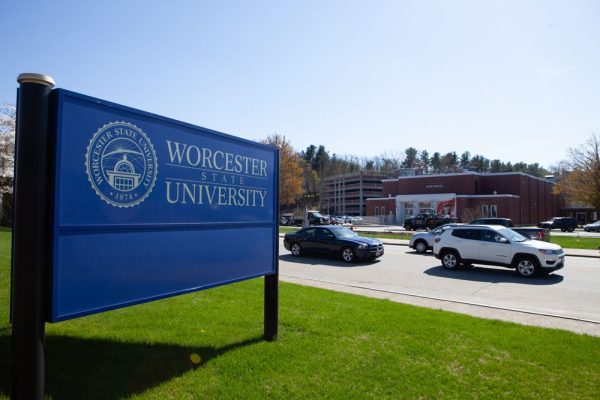
The primary speaker at the event was Shahar Peled, a reservist in the Israeli Defense Forces (IDF) who serves as a Special Forces Commander, according to a flier for the lecture. Peled served as a boots-on-the-ground soldier after the Oct. 7 attack on Israel, and operates as a spokesman for the IDF to counter “the evil propaganda of Hamas,” the flier reads.
The lecture took place on Wednesday, March 13 and had roughly 100 attendees.
In her op-ed, Rein writes that she organized the conference “in my private capacity and in keeping with my lifelong commitments to Jewish advocacy and Zionism.” She alleges that Peled was repeatedly interrupted by protestors who “rang cell phones and pulled a fire alarm.”
In particular, Rein was upset by the presence of three Ph.D. students from the Strassler Center whom she accuses of verbally targeting her in a “specific attack” after the lecture. Rein alleges that one of the students “accuse[d] Israel of genocide in Gaza,” and that all three students “shouted” at her.
“They demand that I step down from my position and threatened to have me investigated on spurious grounds,” she writes.
The fact that Rein had been introduced as Executive Director at the WSU lecture was a primary grievance of both the Ph.D. students and Clark’s leadership team.
Rein further alleges that the next day, a Clark senior administrator expressed discontent that Rein affiliated herself with the University at an event it did not host. The University declined to name that administrator to The Scarlet, among other personnel-related details of the case.
Rein took the comment to mean that she was being asked to censor herself for “my Jewish identity and support for Israel,” she writes.
In a widely-circulated email, President Fithian denies this. “We would provide this guidance to any administrator at Clark University,” he wrote, “and do so regardless of religion, personal identity, or political views.”
The Scarlet wrote to Dr. Rein for comment and received a response from Assumption’s Office of Integrated Marketing.
“My letter of resignation is an accurate representation of what I described,” Rein wrote in her statement. “Recent events do not diminish my genuine respect for the work of the Strassler Center and Clark University…I am now focused on the exciting work of Assumption University. The Center for Civic Friendship has never been more important as we seek to educate fair minded students to be thoughtful citizens.”
Representation Issues Persisted Months Before WSU Event
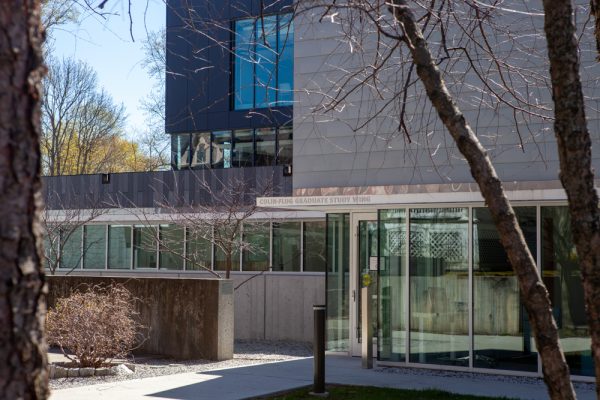
A Strassler Center Ph.D. student familiar with Dr. Rein, who wished to remain anonymous, said that the question of whether Rein was representing herself or the Center and the University in her public activities was a frequent issue.
The student claims that Rein “took liberty with posting things” to the Strassler Center’s public Facebook page after Oct. 7, 2023. The posts seemed to unreasonably favor Israel’s ongoing military operation in Gaza, the student alleged.
“I went to my advisor and [said], ‘I’m really concerned that she’s using our name.’ I was repeatedly told that [Rein] was using her freedom of speech,” the student said. Students repeatedly asserted that statements made by the Center should represent all its members, not just its leaders.
At a meeting of the Center’s Governance Board, those students requested the opportunity to review any statements, or even sign on to them, according to the Ph.D. student. Instead, the Governance Board decided to stop making statements entirely.
Soon after, Rein published a guest column in the Telegram & Gazette on Holocaust Remembrance Day that she signed as Executive Director. Students took issue with the fact that Rein did not distinguish her personal opinion from the opinion of the Strassler Center. Without that distinction, students were offended by Rein’s claim in the article that diversity, equity and inclusion initiatives – such as curriculum “de-colonization”– are “reminiscent of the way teachers and professors during the Third Reich indoctrinated students in the National Socialist world view.”
An archived Facebook post obtained by The Scarlet confirms that Rein’s column was also posted to the Strassler’s Center’s page. “She not only used her name in the article,” the student said, “but she’s using our platform, and had to be told to take it down” by Strassler Center faculty.
Attendees of WSU Event Say More Context Is Necessary
Beyond representation concerns, the Ph.D. student claims that retellings of the lecture at WSU have lacked important context.
“There was no mention that it was an IDF event,” the student said. “There was no mention of the comments… no contextualizing that, in my opinion, [Rein] did something very wrong.”
The student told The Scarlet that they had discussed their concerns with Dean of Students Kamala Kiem and Chief Officer of Diversity and Inclusion Margo Foreman once before the WSU lecture. When they found out about the event, the student told Foreman that if Rein was introduced by her Clark title, they would intervene.
That’s exactly what happened, but the student and another attendee – an alumnus – suggested that the interruption was brief and polite.
Otherwise, the overall feeling was “tense,” the alumnus said. There was a crowd of pro-Palestinian protestors outside the auditorium, he said, some of whom sat in on the lecture, too. He said there were over a dozen police present throughout the building.
“The thing the [three Ph.D. students] were there to do was to engage, in an academic way,” the alumnus said, emphasizing strongly that they did not intend to disrupt the lecture. Other attendees “were constantly disrupting the speaker,” he said, but insisted that the Clark students present did not shout. The Ph.D. student said they regretted telling Rein to “step down” in the heat of the moment, but denies ever threatening her with an investigation.
Both attendees described the disruptions, which included loudly-ringing phones, fire alarms and shouting. Several students sitting silently in the front row with Palestinian flags were removed by police. Both also mentioned an incident in which a woman stood up during the lecture, shook her fist “at students wearing hijabs and call[ed] them ‘savages,’” the alumnus said.
He said that Peled, the speaker, frequently used dehumanizing language when describing the conflict. In a statement published on the LinkedIn of Reichman University, Peled wrote that “it’s not only Judaism vs. Jihadism, Israel and Hamas are a small part of a bigger war… between Western civilization and those who seek to destroy it.” The alumnus claimed that Rein echoed Peled’s rhetoric in her brief remarks.
The Center for Civic Friendship
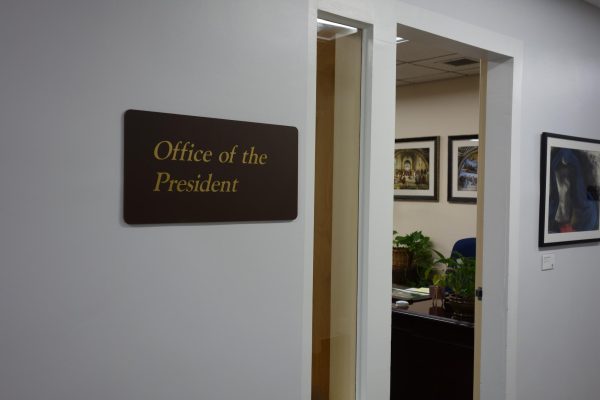
“For citizenship to work, we can’t simply agree and disagree with one another,” said Greg Weiner, President of Assumption University, in an interview with The Scarlet. “We have to do so amid a sense of common purpose. And that’s the idea of friendship,” he said.
According to Weiner, the new Center which Dr. Rein will head up is part of Assumption’s ten-year strategic plan to do just this, approved by the Board of Trustees in February of this year.
While the Center has a mission statement, it is unclear exactly what role it might take on Assumption’s campus. Weiner said that classrooms, clubs and on-campus conversations will feel its influence. He hopes that the Center will eventually sponsor on-campus fellowships for social scientists.
Weiner said that he knew Dr. Rein for “a while” from her position in the Strassler Center and from her work within the local Jewish community. He did not contact Rein regarding the new Center at Assumption until the lecture at Worcester State. “We hope she can do as much for the Center as she’s done for Strassler,” Weiner said.
Weiner is the first Jewish president of a Roman Catholic university in the United States. He said that although there are differences between the Catholic and Jewish religious and academic traditions, these differences facilitate learning.
“People ask me if I feel welcome here,” Weiner said. “I feel entirely at home here and always have.”
Weiner declined to comment on whether Assumption University was aware that Rein would be publishing an op-ed in the Wall Street Journal effectively advertising the new Center. Rein signed the piece with her new title, however, suggesting that she had been in talks with officials at Assumption for some time.
Responses from Clark Leadership
In his April 16 email, President Fithian wrote that he felt it necessary to respond to the situation “because Ms. Rein made her account public.”
Fithian notes that the event at WSU was entirely unrelated to Clark’s campus, but took a hard line on disruptions. He called them “absolutely unacceptable,” but said that the University could not enforce its Code of Conduct off its campus. “The University takes very seriously any allegations of misconduct, but our ability to hold students accountable for behavior off campus is, in fact, limited,” Fithian wrote.
Fithian also denied some of Rein’s claims. “Ms. Rein was not discouraged from engaging in issues or expressing her views freely,” he wrote.
Dr. Thomas Kühne, academic Director of the Strassler Center, offered an even firmer refutation in his April 18 Letter to the Editor.
“Ms. Rein is entitled to express strongly her view of the Israel-Gaza conflict, but others, including students of genocide and the Holocaust, are entitled to reject it equally decisively,” Kühne wrote. “Both views are widespread among Holocaust and genocide scholars.”
Kühne said that “difficult and heated debates” must continue to be held “with a spirit of tolerance” to fight antisemitism and prejudice at Clark University.
“This is the essence of democracy,” Kühne wrote, “more needed today than ever before.”
A senior administrator said the University would decline to comment beyond the statements issued by Fithian and Kühne.
Leo Kerz contributed to this report.
Editor’s note – the following corrections were made to this article at 4:30 p.m. on April 25: the article originally refers to the Ph.D. students as “candidates”; this was corrected. It also erroneously reported that one of the Ph.D. students had met with Deans Kiem and Foreman on more than one occasion prior to the WSU lecture. Lastly, it stated that Dr. Rein had been Executive Director for all 20 years of her employment at the Strassler Center; this is false. The Scarlet regrets these errors.

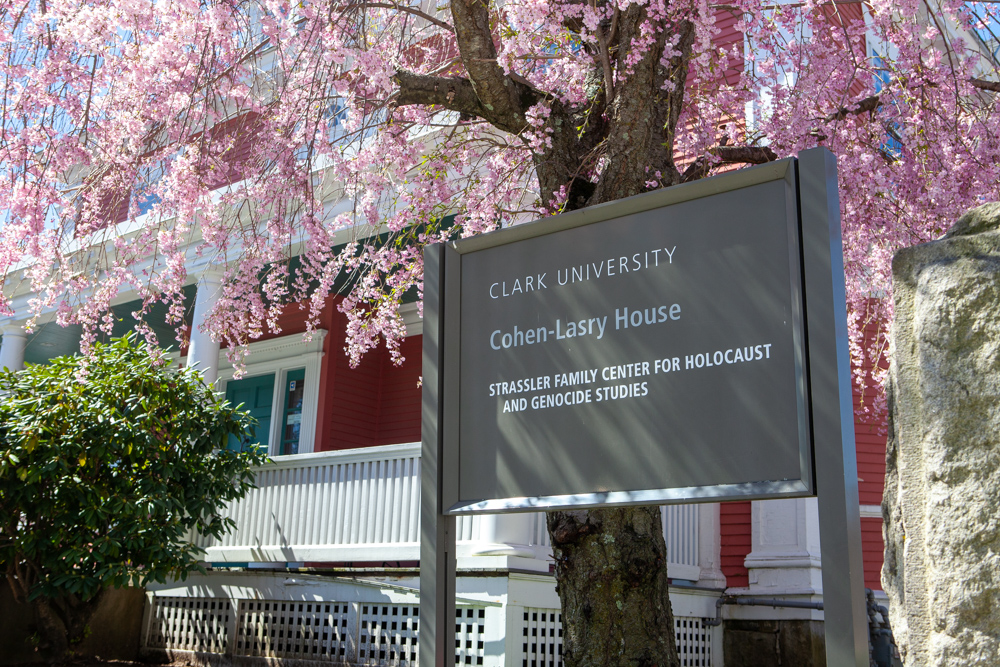
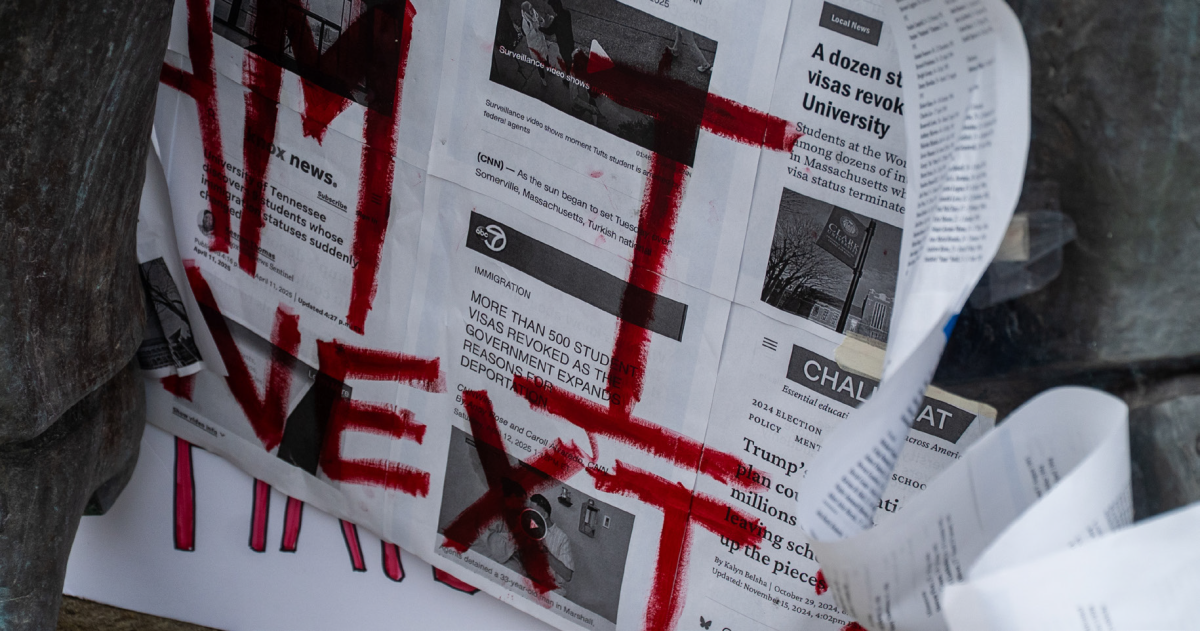

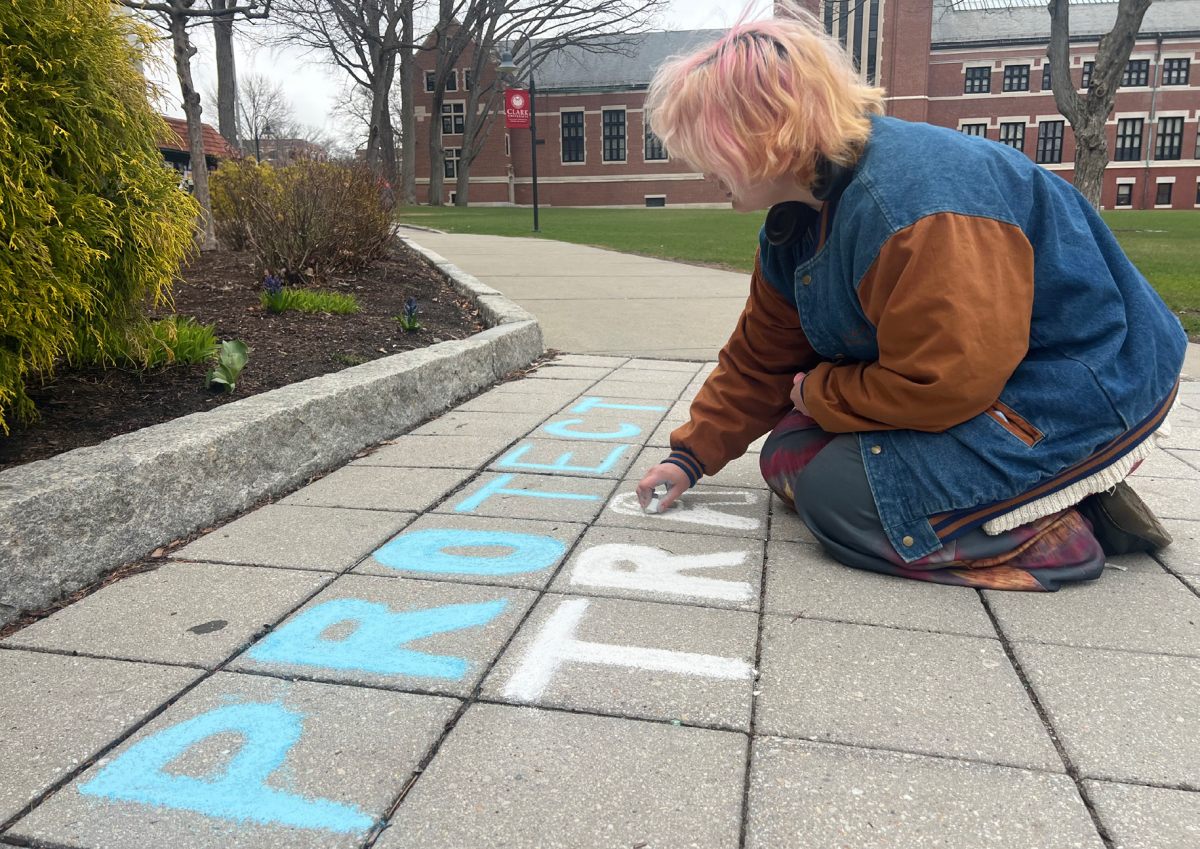
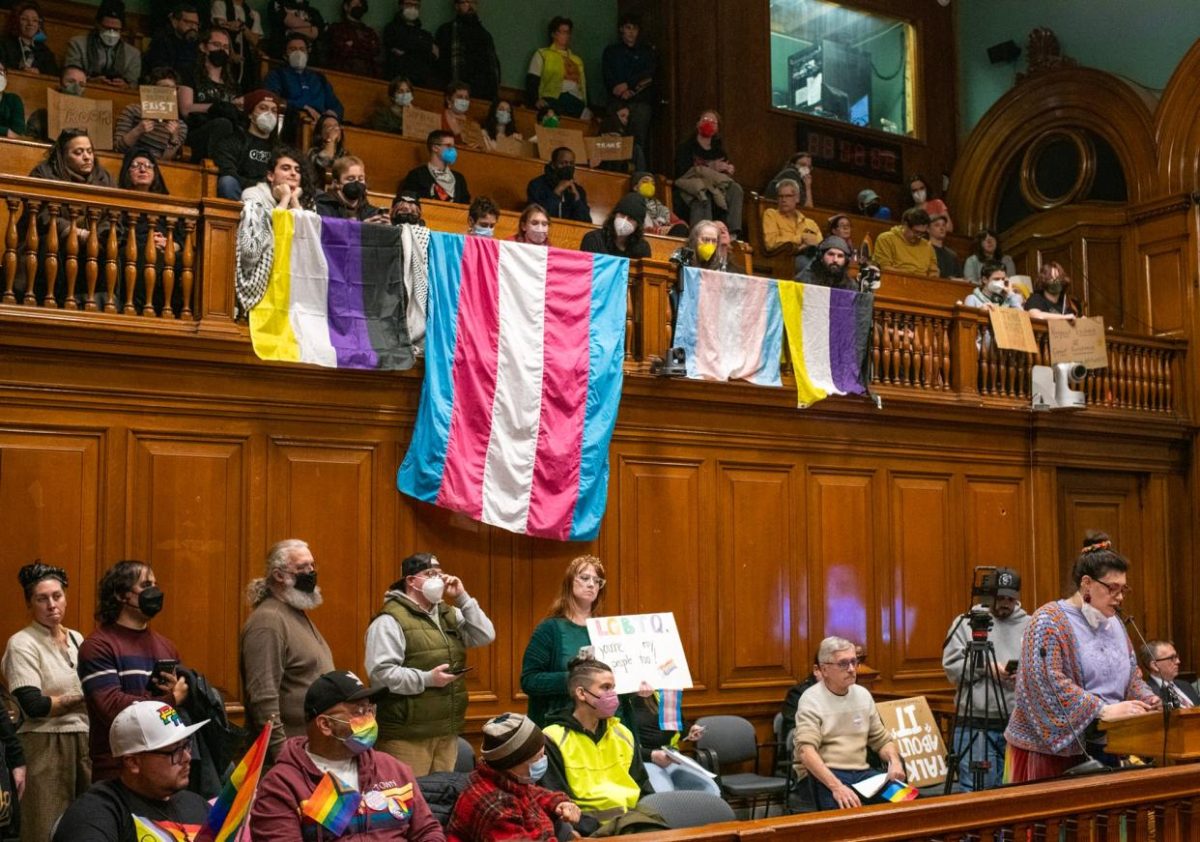
Tetrah Clark ~ Apr 26, 2024 at 4:07 pm
If any of the WSJ articles are paywalled for you, the library provides free access to WSJ and other publications.